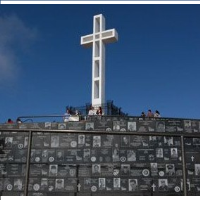U.S. Judge Reluctantly Says Mount Soledad Cross Must Come Down, but 24-Year-Old Case Isn’t over

Just in time for the war on Christmas and all things Christian, a federal judge has ordered (pdf) that a landmark California cross be taken down.
U.S. District Judge Larry Burns said, although he did not personally agree, the court system has decided that the 43-foot-tall cross on federal land atop Mount Soledad implies a government endorsement of religion that violates the Constitution. He ordered that the cross come down within 90 days, but stayed his motion to give the Obama administration and supporters of the cross 90 days to appeal. Again.
The cross has been around in one form or another 100 years and the target of litigation for the past 24 years. The first cross was erected in 1913, stolen and replaced in 1923, then burned to the ground by the Ku Klux Klan after a black family moved into the area. A new cross was erected in 1934 but was blown down by high winds in 1952. It was replaced in 1954 with a 29-foot cross on a 14-foot-high base that remains there to this day.
Lawsuits were filed against the city of San Diego in 1989, charging that the cross violated the California and U.S. Constitutions. Amid the ongoing litigation, the city tried to sell the site in 1998 to a private group, the Mount Soledad Memorial Association. It was transformed into a Korean War memorial with the cross surrounded by six concentric walls containing plaques honoring more than 2,800 veterans. The sale was contested in court and in 2005 voters approved Proposition A, which transferred the property to the U.S. Department of the Interior for use as a war memorial.
That transfer was contested in court. U.S. District Judge Gordon Thompson, Jr. ordered the cross be taken down in 2006, 15 years after issuing his original injunction against it. Meanwhile, the federal case and a state case were combined and landed in Judge Burns’ court, where he ruled in 2008 that the cross could stay because it was sectarian and conveyed “the primarily non-religious messages of military service, death and sacrifice.”
Three years later, the U.S. Ninth Circuit Court of Appeals reversed Burns and unanimously ruled the cross unconstitutional. It suggested that there could be some modification to the site that could preclude having to remove the cross, but offered no prescription. The decision was appealed to the U.S. Supreme Court, which decided not to hear the case in June 2012 and returned it to the lower courts for “final” resolution.
Daniel Mach, an ACLU director who argued the case before the district judge, told Reuters, “This is a victory for religious liberty.” But others do not agree and some of them sit on the Supreme Court. Justice Samuel Alito wrote when the high court rejected the case that the denial of appeal wasn’t a ruling on the case’s merits and that once a final judgment in the case had been rendered, the issue could be raised at a later date.
–Ken Broder
To Learn More:
Judge: Mt. Soledad Cross Must Come Down (by Kristina Davis, U-T San Diego)
U.S. Judge Orders Landmark California Cross Taken Down (by Dan Whitcomb, Reuters)
U.S. High Court Rules It’s Not Their Cross to Bear . . . for Now (by Ken Broder, AllGov California)
- Top Stories
- Controversies
- Where is the Money Going?
- California and the Nation
- Appointments and Resignations
- Unusual News
- Latest News
- California Forbids U.S. Immigration Agents from Pretending to be Police
- California Lawmakers Urged to Strip “Self-Dealing” Tax Board of Its Duties
- Big Oil’s Grip on California
- Santa Cruz Police See Homeland Security Betrayal in Use of Gang Roundup as Cover for Immigration Raid
- Oil Companies Face Deadline to Stop Polluting California Groundwater





